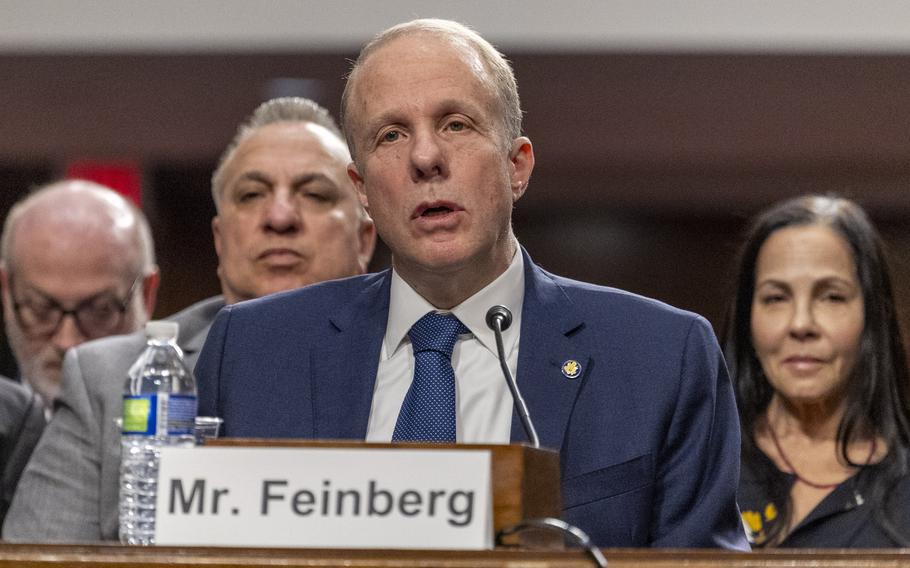
Deputy Defense Secretary Stephen Feinberg testifies Feb. 25, 2025, during a Senate Armed Services Committee hearing. (Eric Kayne/Stars and Stripes)
WASHINGTON — The Senate on Friday confirmed Stephen Feinberg, a billionaire investor who refused to acknowledge Russia invaded Ukraine and defended planned firings at the Pentagon, as the next deputy defense secretary.
The vote was 59-40, with most Democrats in opposition. Feinberg was grilled by Democrats at his confirmation hearing last month for repeatedly declining to name the aggressor in Russia’s war against Ukraine and saying civilian employee layoffs could make the Defense Department “stronger.”
“I’ve spent a career in restructuring companies and dealing with these workforce issues,” Feinberg said. “Every organization goes through some turnover when you have, really, needs to improve. Initially, it’s difficult but the top people will step up and it can be ultimately improving the culture.”
Feinberg, a co-founder of the investment firm Cerberus Capital Management, is a major donor to President Donald Trump and served on an intelligence advisory board during Trump’s first term. Feinberg’s firm has investments with defense contractors and as a student at Princeton University, he joined the ROTC.
He told senators that he would focus on fixing ammunition shortages and prioritizing aircraft development, nuclear modernization and hypersonic weapons as second-in-command at the Pentagon. The position is traditionally tasked with overseeing day-to-day operations, including managing the workforce and budget processes.
Trump, in nominating Feinberg, said he was “an extremely successful businessman” who would “help make the Pentagon great again.”
Sen. Roger Wicker of Mississippi, the Republican chairman of the Senate Armed Services Committee, on Friday called Feinberg “a perfect person” for the deputy defense secretary post.
“He’s well spoken, he’s calm, he’s understated,” Wicker said. “He will be largely invisible but he is the man to help us rebuild the military, reform the way the Pentagon does business and turn this unaudited Pentagon bureaucracy around.”
Feinberg said he intends to use his private sector experience to set up a “war room” to help the Pentagon pass an audit, which it has failed to do for years. He said every program and cost will be combed over, line by line, “with an army of people until it’s done.”
“We’re going to understand where our costs are, why we don’t have our audit, where the financial problems are and then come up with a plan to fix it,” Feinberg said. “It’s a big war room and I think the Pentagon will support it and I think the people will be excited to see it as well.”
Democrats, however, raised concerns that Feinberg will not challenge the Pentagon’s plans to lay off tens of thousands from its 945,000-person civilian workforce, about half of which is veterans.
Feinberg said he believed most of the cuts will be from people who want to retire or resign early even though the first round of layoffs has targeted probationary workers who were recently hired or promoted.
Sen. Richard Blumenthal, D-Conn., urged Feinberg to take into account that many civilian employees were once wearing a uniform and asked Feinberg not use a “meat ax” to carry out mass firings.
“You have to use a scalpel to determine who is necessary and not and eliminating waste doesn’t mean you lay waste to the Department of Defense,” he said.
Other Democrats expressed frustration with Feinberg’s lack of clarity about the invader in the Russia-Ukraine war. Feinberg said he did not want to “speak out of turn” and “undermine” ongoing negotiations to end the conflict, drawing criticism from some senators.
“Mr. Feinberg, we’ve got to live in the real world here,” said Sen. Mark Kelly of Arizona, a Democrat and former Navy captain. “For us not to be able to say an obvious fact is — it doesn’t help a negotiation.”